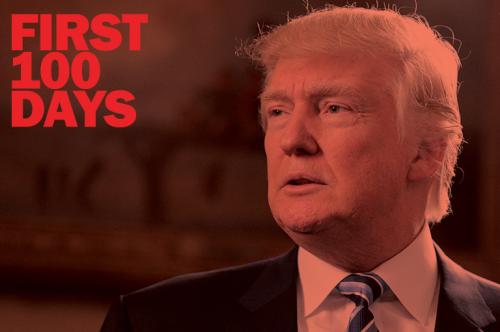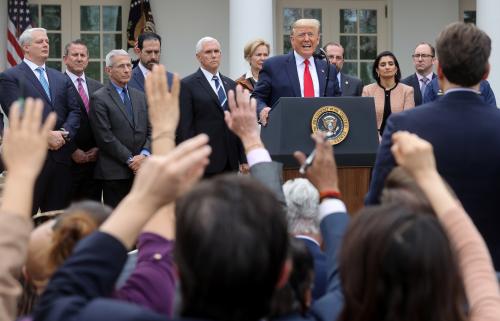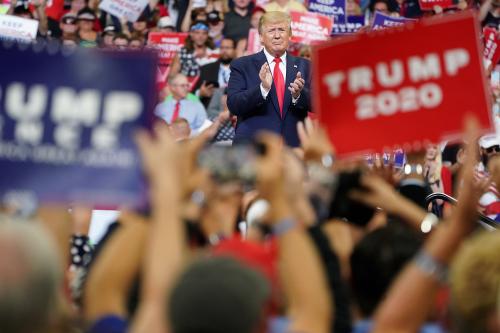Donald Trump was right after he was wrong. The first 100 days is a stupid and arbitrary marker in a presidency. But Trump himself fell right into the trap, bragging during the campaign of all the great things he’d get done in his first 100 days. The result? Reporters have been so eager to grade the new president that they didn’t even wait for the first 100 days to be over. So now that the actual 100 days has been reached, we already have a plethora of grades, most of which are bad. While at this point in their term most presidents are enjoying a honeymoon, Trump seems headed for divorce court.
Thanks to a hyperactive Fourth Estate, the successes and failures of Trump’s first 100 days are well known. On the plus side, Trump has added a new and respected conservative judge to the Supreme Court, he has retaliated against Syrian President Bashar al-Assad for his use of chemical weapons on his own people, and he has presided over a healthy stock market, one of the best in modern history. These are real successes where Trump can, and has, staked claim.
But an overwhelming downside obscures these accomplishments. Most obviously, a cloud has hung over his administration from the beginning: Russian interference in the election. While there is no evidence to indicate that Trump himself had anything to do with it; the mere possibility had people whispering the “I” word—impeachment—as early as Inauguration Day. Even if we put Russian intrigue aside, Trump has quickly accumulated a laundry list of failures and flip-flops. As he began to govern, Trump found that his much-vaunted deal-making skills couldn’t compensate for his lack of policy depth. Trump failed to “repeal and replace” the ACA; he failed twice to draft get-tough executive orders on immigration that could withstand scrutiny by the courts; he had to retreat from insisting that money for his famous wall on the Mexican border be included in the budget negotiations that would keep the government running. He has done an about-face on major issues such as NATO, which he once called obsolete and is, apparently, no longer. Ditto Syria, China, the Export-Import Bank and perhaps NAFTA. He has been slower to nominate the hundreds of critical sub cabinet jobs needed to make an administration work than all other recent presidents. And his job approval ratings are lower than any other modern president at this point in time.
But other presidents have had rough starts to their administrations. Failure to pass legislation, reversals in court, having to get rid of appointees who turn out to have pasts, abandoning or reversing campaign positions—all of these have happened to presidents who have gone on to be successful. What makes the start to the Trump presidency different is the elephant in the Oval Office—Donald Trump’s “temperament.”
The dictionary defines temperament as “the combination of mental, physical, and emotional traits of a person; natural predisposition.” Presidents are usually pretty sophisticated actors. They tend to have a strong sense of what is and what is not in their own self-interest and to act accordingly. But so far President Trump has consistently behaved in ways that undermine his own self-interest. Take the Russia issue. It is entirely possible that he is completely innocent. But almost everything he has said or done since the election undermines that possibility, and reminds one of that old saying: where there’s smoke there’s fire. Moreover, he has consistently said things that are not true—like that Obama had him wiretapped or that his Electoral College victory was the biggest since Ronald Reagan. Following these tweets or statements, he inexplicably has stood by them in the face of no evidence. He repeatedly seems to go out of his way to make enemies, not friends, by attacking the press and reporters personally. There have also been times when his words in front of a group have been completely inappropriate. Why would the President of the United States appear before the annual Prayer Breakfast and talk about how pathetic his replacement (Arnold Schwarzenegger) was on a reality television show? Why would he go to the CIA headquarters and complain about press estimates of the size of his inaugural crowds to the assembled elite of American intelligence?
To see how central this question of temperament is to evaluations of Trump’s first 100 days is, try the following thought experiment. Suppose sober, likeable Vice President Mike Pence was president and had had, more or less, the same first hundred days. Sure, there would be criticism especially about how the Republicans were not ready to do serious policy. But would there be the same level of concern that somehow the president was “unhinged?” I doubt it. And therein lies the real issue in the first 100 days.







Commentary
Temperament: The real issue in Trump’s first 100 days
April 30, 2017